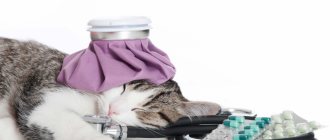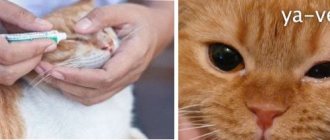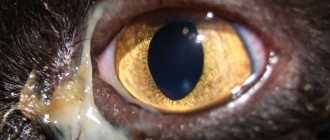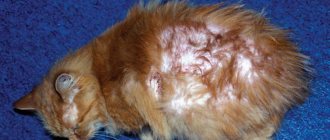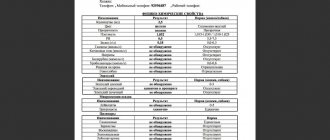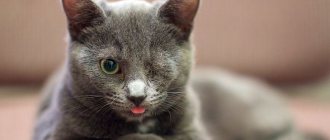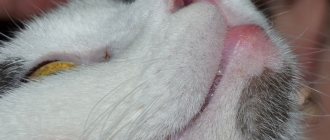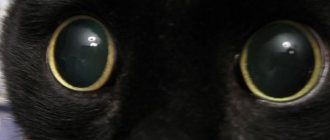A cat's cough indicates that the animal's airways are irritated by a foreign object or that your pet is sick. This symptom cannot be ignored - you need to take the animal to a veterinary clinic for examination. Once diagnosed, it is important to begin treatment immediately.
- 2 How are coughing animals diagnosed?
- 3 Basic methods of treating pathologies that cause cough
3.1 How to treat a kitten’s cough
How does a cat cough?
Often, by coughing, cats frighten their owners with a pose in which her body shudders, as if in convulsions, and with hoarse loud sounds escaping from the throat.
- This state of affairs is like a cat choking and unable to breathe.
- The sight is terrible, and indeed a foreign body could have gotten into the throat, but this is far from the main reason.
Just like in humans, the causes of cough in cats vary widely. Only in cats they are different. By its nature, cough is divided into reflex and symptomatic.
Reflex cough
- When a foreign body gets into the animal’s throat (food or respiratory tract). In such a situation, the cat coughs and wheezes, twists its tongue, turns its head in different directions, trying to get rid of the foreign object.
- When exposed to external irritants and allergens: smoke, pepper, flour, washing and other small powders, caustic gases: exhaust from cars, household chemicals, and even perfume.
Symptomatic cough
- Respiratory cough is caused by infectious diseases of the upper respiratory tract: bacterial, viral, fungal (bronchitis, pneumonia, rhinotracheitis, laryngitis, etc.). Such diseases are often accompanied by the following symptoms: weakness, discharge from the nose and eyes, increased body temperature. If the animal is domestic and only comes into contact with you, then the disease could well have been brought on by the soles of outdoor shoes.
- Cough caused by helminthic infestations. It occurs due to toxins that appear during the life of worms and their larvae. Helminths even appear in domestic cats if the animal is not treated with anthelminths in a timely manner. This must be done once every six months.
When a cat develops helminths, it is usually accompanied by an enlarged abdomen, a sharp decrease in appetite, lethargy, vomiting, diarrhea, the presence of mucus, blood or parasites in the feces, and an increase in temperature.
Inhalations for wet cough
A productive wet cough without fever can be treated with inhalations. These procedures, based on the inhalation of medicinal and biologically active substances, help reduce thickness and viscosity, more actively liquefy and remove sputum. To treat coughs, steam inhalers and nebulizers are used, to which special medications are added. Inhalations that help moisturize the mucous membrane help to quickly reduce pain, reduce the viscosity of sputum, eliminate spasms and relax the muscles of the bronchi. You can use Doctor MOM® Phyto ointment, which is locally irritating , distracting, anti-inflammatory and antiseptic effect.
When should you contact a veterinarian?
If the condition is serious and the cat is very weakened, treatment should only be carried out under the supervision of a veterinarian, since if the helminths die massively, the animal may suffer from intoxication.
- Cough that occurs due to diseases of the heart and cardiovascular system. In this case, in addition to coughing, you may experience shortness of breath, lethargy and heavy breathing. This also requires consultation with a specialized veterinarian who understands feline cardiac diseases.
- Allergic cough. Including bronchial asthma. Caused by allergens, which were already mentioned above. This cough is quite common, since cats have a very sensitive sense of smell and are very susceptible to various allergens.
- Oncology. Cats are also susceptible to cancer. Metastases can penetrate into the lung tissue, in which case a cough occurs. This is usually an age-related disease that occurs in cats around 10 years of age. Treatment is possible both surgically and medicinally. The main thing is to seek medical help in a timely manner.
- Traumatic lesions of the throat, trachea or lung. They arise as a result of fights, falls and other traumatic blows. After which air or pus can accumulate in the chest, expanding the animal’s chest, it cannot breathe and dies from suffocation.
- Fungal diseases: blastomycosis and mycoses.
- Trichobezoars are hairballs in the stomach. Occurs due to licking. As a rule, such a cough ends in vomiting with the release of a hairball.
This list is far from complete, therefore, if a cough syndrome is detected in your pet, it is best to consult a doctor.
Since the nature of the occurrence of cough is different, the cough itself is different. To determine the cause of cough, veterinarians divide it into types.
Types of cough in cats
- In terms of duration, the cough can be chronic - it lasts more than one month, sometimes lasts for years, and acute - it arises spontaneously and lasts several days.
- Based on strength, coughs are divided into weak, strong and superficial.
- Intensity: mild or hysterical, turning into vomiting.
- According to the nature of the discharge: dry cough or wet cough with mucus, blood or sputum.
- By timbre: ringing or muffled.
- By time of manifestation: seasonal, for example, in the spring, an allergic cough most often manifests itself. It happens that an animal coughs at a certain time of day in the morning or evening
- By frequency: coughing attacks occur frequently or, conversely, rarely.
Observing the animal's cough, determine its type using the above parameters. This will help the veterinarian determine the full picture of the disease and make the correct diagnosis.
Diagnostics in a veterinary clinic
Diagnosis is based on identifying the cause of the cough. The veterinarian examines the animal and collects anamnesis. The owner must clearly describe the signs, frequency and nature of the cough, highlight some characteristic features, for example, blood, sputum production.
A cough with sneezing may indicate cat flu. If it is accompanied by wheezing, then most likely your pet has asthma. Sputum production coupled with weight loss and diarrhea indicates the possible presence of parasites.
Necessary diagnostic methods include:
- general and clinical blood tests;
- serological blood test;
- Analysis of urine;
- chest x-ray;
- ECG;
- tracheal endoscopy;
- organ biopsy;
- culture of bronchial secretions for microflora.
Until a particular diagnosis is confirmed, the veterinarian prescribes maintenance therapy to relieve coughing attacks.
How to help your pet
First, calm down yourself and try to calm your pet. Frankly speaking, at home it is only possible to alleviate the condition of a sick animal.
- To do this, ventilate the room, humidify the air, but avoid drafts, so as not to harm the already sick animal.
- You can inhale warm, moist air by running hot water into the bathroom, and then leave the cat in the bathroom for a while.
Cats are very sensitive to emotions, so be sure to caress your pet, talk to him in a calm, confident tone, then the animal will understand that the owner will help him, this will alleviate the patient’s condition.
Under no circumstances should you give medications before going to the veterinary clinic; this is important for making an accurate diagnosis; besides, not knowing the exact cause of the cough can only harm the animal.
Veterinarian recommendations
Each diagnosis requires special treatment:
- For example, infections are treated by increasing the animal’s immunity, which in the case of an allergic cough can worsen the patient’s condition. Antihistamines are needed here. If an allergen is identified, it is advisable to completely eliminate it from the animal’s life.
- For asthma, inhalers are prescribed; if this does not help, glucocorticoids are prescribed.
- A course of antibiotics is used to treat viral infections. Cough is eliminated with the help of mucolytics and expectorants.
- Helminthiasis is treated comprehensively, and medications are taken twice to completely destroy adult worms and their offspring. Be sure to monitor the animal’s condition after such treatment; in case of dehydration and exhaustion, infusion solutions are prescribed.
- When removing a foreign body, various tissue damage is sometimes discovered. Wounds are treated with anti-inflammatory drugs, and antibiotics are prescribed if necessary.
In any case, one well-known fact should be remembered. The best treatment for cats, as well as for people, is prevention and prevention of the disease.
Sputum with wet cough
Before treating a wet cough in an adult, it is necessary to conduct a laboratory test of sputum to determine the nature of the disease. Tracheobronchial secretion may have a liquid, thick or viscous consistency. The presence of a large amount of mucus in it signals the presence of an allergic or cold-infectious process in the bronchi and lungs. The yellowish-green color of sputum, caused by impurities of pus, may indicate the development of bronchitis or pneumonia. The appearance of white, cheesy discharge during expectoration warns of the likelihood of a fungal respiratory infection, and clear, watery sputum usually accompanies viral infections or chronic diseases of the respiratory system.
It is important to know!
When treating a wet cough accompanied by sputum discharge, the use of antitussive drugs is contraindicated. By blocking the central or peripheral parts of the corresponding reflex, they lead to the accumulation and stagnation of a large amount of mucus, which is a favorable environment for the proliferation of pathogenic microflora. Drugs for the treatment of wet cough are mucolytic agents. The group of modern effective mucolytics made on the basis of plant components includes Doctor MOM® syrup and Doctor MOM® herbal lozenges.
Preventive actions
- The cat's bed should be in a warm room, protected from drafts, preferably near a radiator. However, cats themselves choose a warmer place to sleep, do not deny them this.
- Feeding raw meat and fish is a sure way to become infected with parasites. Therefore, such treats should be eliminated.
- Strengthen your pet's immunity: buy super-premium food or use high-quality natural products. Include vitamin and mineral supplements recommended by your veterinarian in your pet's diet.
- Visit your veterinarian periodically for a preventive examination, and promptly seek medical attention if necessary.
- Avoid contact with unfamiliar animals, regularly wash your shoes and the hallway after each walk. Cats love to roll in the dust, and there can be parasite eggs and infections and other troubles. When you return home, wash your hands before petting your cat.
- Stop smoking, it is harmful for both you and your pet. Passive smoking is fraught with stomach diseases and bronchial asthma.
- Treat your cat for worms in a timely manner and follow the vaccination schedule.
- Do not give him bones or easily damaged toys.
But if your pet happens to get sick, and you love him and sincerely want to help him, stop self-medicating and make an appointment at the veterinary clinic as soon as possible. After all, the effectiveness of treatment depends on the speed of diagnosis.
Drink plenty of warm fluids for wet coughs
When answering the question of how to cure a wet cough in an adult, it is worth mentioning another necessary and effective method of treatment: drinking plenty of vitamins. During a cold, you should drink more liquid than usual to moisturize the mucous membrane and quickly thin the mucus. This can be warm mineral water, herbal decoctions, teas, fruit drinks, milk in combination with honey, etc.
